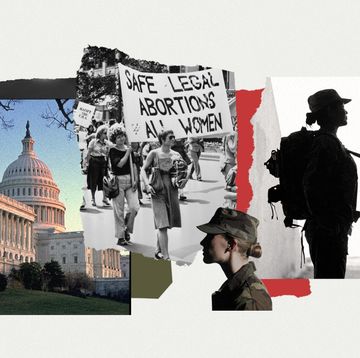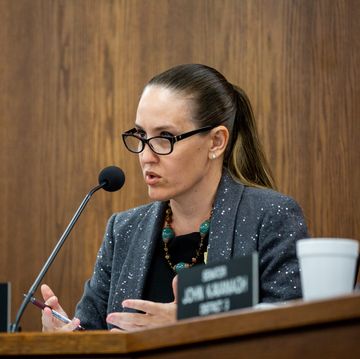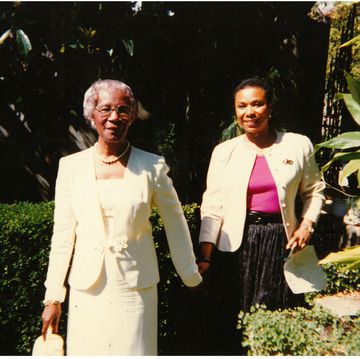Update, 8/31: Nearly 15 months after the death of Layleen Polanco, a transgender woman of color who was being held in solitary confinement at Rikers, her family will receive a $5.9 million settlement. According to the family's lawyer David Shanies and the city Law Department, that is the highest settlement in New York's history concerning a death in jail, THE CITY reports.
Polanco's sister Melania Brown said settling the suit was a "difficult decision" but only the beginning in their pursuit of justice. "Despite the settlement, my family isn’t done fighting," Brown said in a statement, per The Gothamist. "This lawsuit was only one way we were seeking justice for Layleen and this is only just the start." She also reiterated that no guards involved in Polanco's death had been fired. "To this day, despite evidence of negligence, no one has been held accountable for my sister’s death," she said.
Despite news in late June that 17 Rikers guards, including a captain, would face discipline for their roles in Polanco's death, there's no clear indication that this happened. According to Gothamist, only four Rikers employees have been suspended without pay. Mayor de Blasio has not announced the identity of the guards in question, nor any disciplinary actions taken against them. "I look forward to a day when we devote this level of resources to treating all people, including those in jail, with humanity and respect, and multi-million dollar settlements over senseless deaths are no longer needed," the family's lawyer, David Shanies, told Gothamist.
Update, 6/29: More than a year after Layleen Polanco, a 27-year-old transgender woman of color, died in solitary confinement, a group of correction officers are facing disciplinary action. The New York Times reports that 17 Rikers guards, including a captain, will be disciplined for their role in Polanco's death.
Mayor Bill de Blasio announced the captain and three other officers would be suspended without pay immediately. "The death of Layleen Polanco was an incredibly painful moment for our city,” de Blasio said in a statement. "What happened to Layleen was absolutely unacceptable and it is critical that there is accountability." According to the Times, the disciplinary action is due partially to Rikers guards failing to check on Polanco every 15 minutes, as required, during her final hours.
This announcement also came shortly after new footage from Rikers was released, showing guards waiting more than 90 minutes before calling for help for Polanco. In the recently-released footage, two corrections officers can be seen opening the door to check on Polanco and are seen laughing while calling out her name. She was pronounced dead less than an hour later. Polanco family lawyer David Shanies called the video "horrifying for the family" and said the officers' laughter is "a symbol of the complete disregard the entire system had for Layleen," according to BuzzFeed News.
While this action is a step forward in finding justice for Polanco, Shanies told the Times, "Most employers would not wait a year before trying to remedy a problem of this magnitude."
Update, 6/13: New footage outside the Rikers Island jail cell in New York City where transgender woman Layleen Xtravaganza Cubilette-Polanco died last June reveals that guards waited 90 minutes before calling for help. Her family told NBC News that the footage shows that guards failed to provide her with the care she needed when she was having complications from epilepsy.
"The video is the last piece of the puzzle," David Shanies, an attorney for Polanco's family in a wrongful death lawsuit against the City of New York and Rikers staffers, told NBC. "It's the last bit of indifference to her life that we saw and recklessness to a person who obviously needed help."
Original post, 6/10:
Nearly a year after Layleen Polanco, a 27-year-old transgender woman of color, died in solitary confinement at Rikers Island, a six-month investigation into her death concluded without the filing of any criminal charges. Polanco's tragic death sparked outrage in the LGBTQ+ community and fueled action for cash bail reform in New York City. Here, what you need to know about Polanco and the outcry for justice surrounding her death.
What happened to Layleen Polanco on June 7, 2019?
On June 7, 2019, Polanco was found unresponsive in her cell, though it was unclear at the time how exactly she died. She was being held at the Rose M. Singer Center on Rikers Island, a woman's facility, and was reported to have been in solitary confinement following an alleged fight. According to the Washington Post, the New York City Department of Correction reported that a custodial staff member tried to revive her using CPR and then a defibrillator before a member of the medical staff arrived. She was pronounced dead by 3:45 P.M.
The DOC tweeted on June 8, 2019 that it was investigating her tragic death, writing, "We take this matter extremely seriously. We have so far determined the death was not the result of violence or foul play. We will share more information as we determine the cause."
The Post reported that Polanco was arrested on April 13 and detained since April 16 on misdemeanor charges of assault and criminal possession of a controlled substance. Polanco was being held on $500 bail as a result of a years-old prostitution charge.
What did the autopsy report deem the cause of death?
A July 2019 autopsy report concluded Polanco's manner of death was natural and the cause was, "sudden unexpected death in epilepsy (SUDEP) due to a mutation in the CACNA1H gene," per ABC News. A lawyer for Polanco's family said she should've never been placed in a solitary unit and that officials knew that Polanco had epilepsy before making that decision anyway. “It was a deliberate, considered decision to do this,” the family's lawyer, David Shanies said in a statement. “It’s hard to imagine any condition that would be more contrary to segregation, unsupervised, locked in a box, than epilepsy.”
Donna Lieberman, the executive director of the New York Civil Liberties Union, said Polanco's death "shows the kind of culture" of abuse and neglect allowed in the city's jail system, per the Associated Press. “It is devastating that had Layleen been able to make her $500 bail, she would not have been in Rikers at all,” Lieberman said in a statement. “The inability to pay a few hundred dollars may have meant life or death.”
Will any criminal charges be pressed by the Bronx District Attorney's office?
On Friday, June 5, 2019, Bronx District Attorney Darcel Clark said in a statement that the investigation into Polanco's death "found no evidence of criminal wrongdoing." She explained that the purview of the investigator's office was "not to determine whether it was a wrong decision to place Ms. Polanco into Punitive Segregation while she was suffering from a documented seizure disorder; the purview of this Office is to determine whether that decision rose to the level of criminal behavior."
The statement continued, "After an in-depth investigation by my Public Integrity Bureau, we have concluded that we would be unable to prove beyond a reasonable doubt that any individual committed any crime associated with Ms. Polanco’s demise." Social media also pointed out that the office deadnames Polanco in the statement released on Friday, listing Layleen Polanco's birth name in the report.
Although no criminal charges will be filed, the investigation found that Polanco was not observed by a suicide prevention agent for 47 minutes. "At a minimum, every inmate housed in Punitive Segregation shall be observed at least once every 15 minutes at irregular intervals," Margaret Garnett, the commissioner of the Department of Investigation, said, citing DOC policy. "This violation was referred to DOC for appropriate administrative action."
Following the investigation's conclusion, Polanco's family released a statement to the New York Post through their lawyer:
"We never believed the Bronx District Attorney would hold anyone criminally responsible for it. Layleen’s family has received amazing support from the community, but they have never relied on anyone but themselves, least of all the city government, to get justice for Layleen. In their pending federal lawsuit, they will hold Layleen’s killers to account."
How has the nation responded to Polanco's death?
The Legal Aid Society, which represented Polanco, released a statement following the news of her death, saying, "Ms. Polanco’s passing is a tragic reminder of the heightened risk and physical and emotional torture that transgender people—especially those from communities of color—face in the criminal legal system, particularly while in custody. Her heartbreaking and untimely death warrants a swift, complete, independent, and transparent investigation from the City. We join New Yorkers in demanding justice for Ms. Polanco, her family, and for her community."
Polanco's family also released a statement through their lawyers, saying, "We are heartbroken over the death of our beloved Layleen, whose bright light was an inspiration to all who knew her. as we gather to mourn this tremendous loss, we are left shocked and outraged by the stony silence from the Department of Correction, Mayor’s Office, NYPD, and City government. The family demands answers, and we are entitled to them."
In response to Polanco's death, the New York Campaign for Alternatives to Isolated Confinement launched the #HALTsolitary Campaign, which unites advocates, allies, and attorneys to end solitary practices within the city's jail system. In a statement, the group’s members said:
"While we fundamentally believe the racist and transphobic criminal legal system will never be a source of justice or safety, we are nonetheless saddened and outraged by Bronx District Attorney Darcel Clark’s callous disregard for the life of Layleen Polanco. Both New York State and New York City must act immediately to bring justice for Layleen. Facing sex work and drug charges, Layleen never should have been in jail, and both must be decriminalized. Furthermore, it is precisely because New York would lock a person with a dangerous seizure condition in solitary confinement that this medieval torture—this chamber of living death—must be abolished for everyone."
Activists have also spoken out about her death—and the previous lack of information surrounding it. Rep. Alexandria Ocasio-Cortez tweeted that no one should be kept in solitary confinement, noting Polanco's story:
And actress and transgender activist Indya Moore tweeted about Polanco, saying, "She was one of the most beautiful women I ever seen who was trans. She and so many other girls were an example to me." They also spoke at the protests at Foley Square in New York City on July 29, 2019.
No New Jails NYC also held a march for Polanco and other LGBTQ+ people of color; the organization supports closing down Rikers Island without building new jails.
How to help:
So far in 2020, the Human Rights Campaign has reported at least 12 transgender or non-conforming people have been killed by violent means. Last year, the HRC tracked at least 26 deaths due to fatal violence, "the majority of whom were Black transgender women." There are several ways to combat these disturbing statistics and fight for the equality of the Black and transgender community.
New York City's Emergency Release Fund was launched last year following the death of Polanco and prioritizes the release of people within the LGBTQ+ community. According to BAZAAR.com, between their August 2019 launch and March, the organization has bailed out at least 20 people. You can contribute here.
In 2019, the New York legislature passed a package that would eliminate cash bail for many misdemeanors and nonviolent crimes. But New York Gov. Andrew Cuomo recently rolled back some of last year’s bail reform three months after the measures went into effect. The rolled-back initiative is set to go into effect on July 1. In a May 2020 Teen Vogue op-ed from Polanco's sister, Melania Brown she urged Cuomo to stop rollbacks to the state's bail reform law. Instead, Brown called for the legislature to repeal the Walking While Trans ban and decriminalize sex work. Both of those initiatives are linked here.
Here are a list of 15 other organizations to support:
- Human Rights Campaign
- Black Visions Collective
- The Okra Project
- Trans Women of Color Collective
- National Black Trans Advocacy Coalition
- National Center for Transgender Equality
- The Transgender Law Center
- Marsha P. Johnson Institute
- TGI Justice Project
- Trans Women of Color Survival Fund
- BreakOut
- Homeless Black Trans Woman Fund
- Trans Latina Coalition
- SNaPCo
- Sylvia Rivera Law Project













